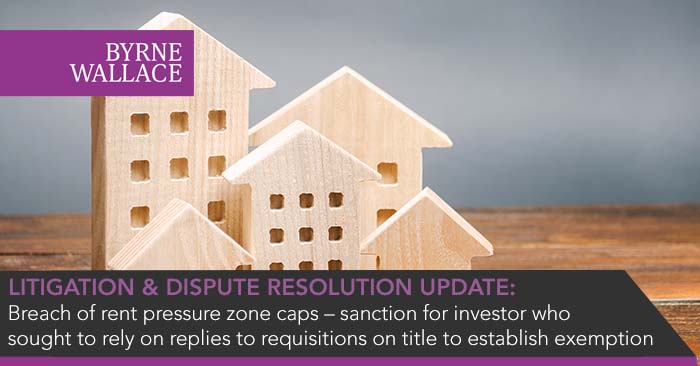Breach of rent pressure zone caps – sanction for investor who sought to rely on replies to requisitions on title to establish exemption
Wednesday, 05 April 2023
The Circuit Court has recently confirmed that a lack of knowledge of prior residential tenancies is not a defence to a breach of rent pressure zone ("RPZ") rent caps. If the letting history of the property is unknown, it should be interpreted that the rent caps apply.
The rules
If a residential tenancy is in an RPZ, the rent cannot be set above the limits prescribed by the Residential Tenancies Act 2004 (the "Act"). Previously that limit was 4% per annum. Since December 2021 the rent cap has been set at 2% per annum.1 There are limited exemptions to these restrictions. Of relevance to most potential purchasers of residential property, is that the rent cap in RPZs does not apply where there has been no tenancy of the property in the previous two years (or 1 year for a protected structure).
Purchase by investor and RTB sanction
WOW Investments Limited (the "Purchaser") purchased a property from a bank, as mortgagee in possession (the "Vendor"). As part of the sale, the Purchaser raised the standard requisition on title, “Is the property or any part of it let or was it let within the last two years?”. The reply given was “No. The property is currently vacant and the Vendor as Mortgagee is not aware of the terms of any previous lettings”.
Following the sale the Purchaser rented out the property without regard to the RPZ restrictions. It was investigated by the Residential Tenancies Board ("RTB") who found there had been a letting of the property in the previous two years and the RPZ rent cap had been breached. The Purchaser was sanctioned €7,437.50 by the RTB.
Appeal to the Circuit Court unsuccessful
The Purchaser appealed the RTB’s sanction to the Circuit Court.2 While the Circuit Court reduced the sanction payable by the Purchaser, it was unsuccessful in its appeal. The Court held that the reply given to the requisition on title created ambiguity on the issue of prior tenancies to such an extent as to be of little value to a purchaser.
The Court accepted the Purchaser had proceeded with the purchase and tenancy on the basis that there was no prior relevant tenancy. It held however that the Act cannot be ignored, or side stepped in a sale. Mortgagees selling in possession do not have a preferential type of exemption or presumption of a lack of knowledge of previous tenancies. In the Court’s view there was a presumption that the Act applies. Accordingly, if the vendor does not know the situation, it should be interpreted that the Act applies unless otherwise proven. The Court held a lack of knowledge of the applicability of the Act or of prior tenancies is not a meaningful defence to a breach of RPZ rent caps.
Practical steps
The Court outlined how in these type of situations, a purchaser’s remedy (if any) is against a vendor, not an affected tenant. In these circumstances it said a purchaser should insist on comprehensive replies to requisitions raised in a sale and details of previous tenancies. The Court said this might be achieved, for example, by providing copies of previous tenancy agreements or if none, a statutory declaration or a statement from a competent person setting out the tenancies. The Court noted that it would also be prudent for a vendor and purchaser to carry out searches against the property with the RTB tenancy register and relevant letting agents, where known.
Concluding comment
The decision is an important reminder for investors purchasing residential properties to insist on comprehensive replies to requisitions on title. The consequences of not doing include sanction by the RTB, refunds of overpaid rent and loss of investment in receiving rent at a lower rate than initially forecast when making the decision to invest.
For further information please contact Valerie Hourigan, Gráinne Murphy or Jennifer Ring in the ByrneWallace LLP Litigation and Dispute Resolution Team.
1 Or if it is lower (which is unlikely in the current market), the annual rate of inflation calculated by reference to the harmonised index of consumer prices.
2 Unreported, Dublin Circuit Court, Judge John O’Connor, 3 November 2022.

